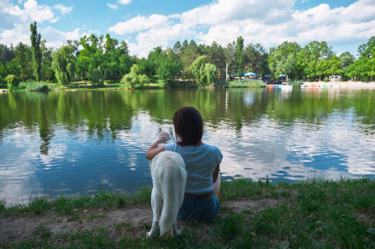Rights Of Nature: What's In A Name?

By Kevin Westerling,
@KevinOnWater

When I first heard there was a move afoot to grant Lake Erie “human” rights, I was a bit put off, much like I was when my wife brought home a wall plaque proclaiming that “Dogs Are People Too.”
But where I can afford to be overly literal and critical when it comes to home decor, it would be irresponsible to dismiss the Lake Erie initiative and the larger Rights of Nature movement based on semantics. I do, however, think the rhetoric around granting “personhood” status to nature obfuscates rather than helps; waterbodies (and dogs, for that matter) do not need to be personified in order to qualify for our care and protection — they are already perfectly deserving of it.
The particular rights being sought for nature differ according to where the cases are taken up, but they have been neatly summarized in this GreenBiz explainer as “the right to exist, flourish, thrive, and regenerate.”
The roughly decade-old movement has worked well in Ecuador and New Zealand, but has struggled to gain a foothold in the U.S.
Most recently, a judge in Ohio struck down the Lake Erie Bill of Rights (LEBOR), which was initially passed as an amendment to the city’s municipal charter but never enacted. In his eight-page opinion, Senior U.S. District Judge Jack Zouhary stated that "LEBOR is unconstitutionally vague and exceeds the power of municipal government in Ohio."
Were it upheld, the law would have allowed the City of Toledo and its residents to sue businesses and governments on behalf of the lake. Further, and perhaps more damning, it would have invalidated conflicting state laws and regulations and taken precedence over federal permits and licenses.
In addition to the matter of authority, potential financial repercussions have also produced backlash.
In Florida, there is more legislative momentum to restrict Rights of Nature laws rather than pass them. In arguing against legal standing for nature that would potentially make a waterbody the aggrieved party in a lawsuit, Rep. Blaise Ingoglia warned that "This will be chaos and will damage our tremendous economy.”
“There will be no such thing as affordable housing in these areas that have these amendments,” he added, imagining that “someone sues you on behalf of the ant hill on the property.”
So, there is clearly an ideological gap to be bridged in some cases, and perhaps bill proposals have been drawn too broad in others — such as in Toledo, where Judge Zouhary said of LEBOR, “This is not a close call.”
On the other hand, maybe bold moves are needed to save our waterbodies, and Rights of Nature can be part of the solution if correctly articulated, designed, and pursued. Political opposition will always be a difficult hurdle to clear, but general support for a clean, healthy, and sustainable environment remains strong.
"Let’s save Lake Erie — but do it legally," Ohio Attorney General Dave Yost offered.
That’s easier said than done, but I respect the Rights of Nature proponents for trying to forge a new path.
Just don’t ask me to say that “Lakes Are People Too.”
